Choosing a planter for orchids
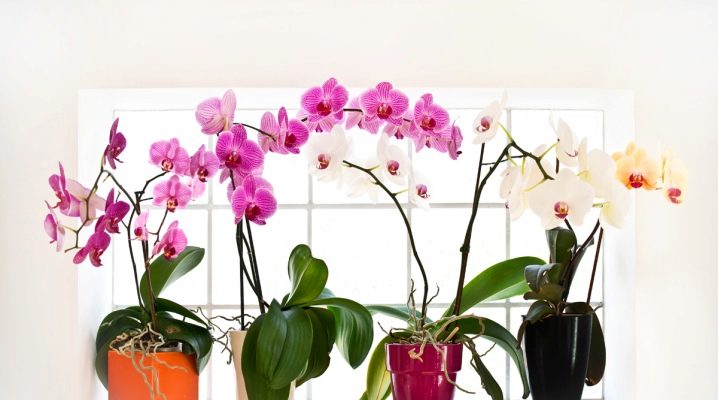
Orchids are very beautiful and exotic flowers, and if you leave them in an unprepossessing pot, then when you look at the composition, there will always be some dissonance. When purchasing a plant, it is better to immediately look for an elegant planter for it.
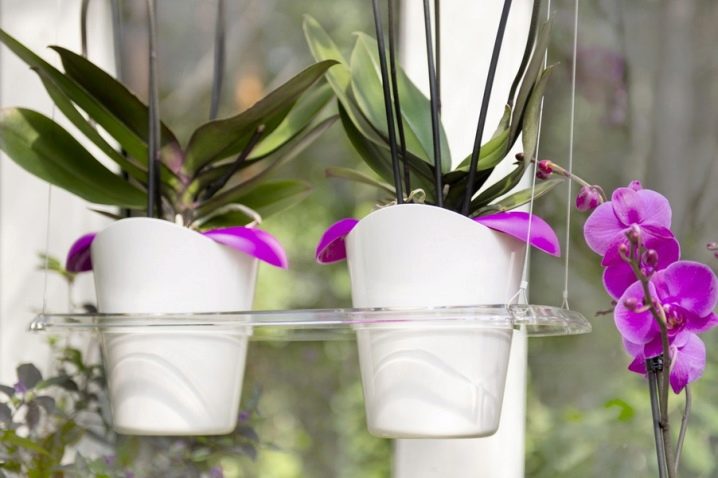
Views
The orchid planter is a decorative vessel in which the plant pot is placed. In addition to the decorative function, the container is also responsible for maintaining the microclimate for the harmonious development of culture. The planter should be made of a material that will not create excessive moisture, but will provide the correct temperature and lighting.
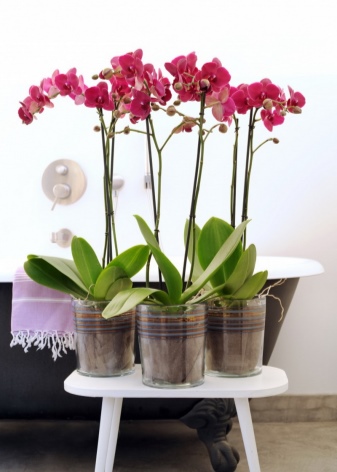

Some orchid species have photosynthetic roots and will require both clear pots and planters. It should be mentioned that since the pots, as a rule, have no holes, the liquid remains inside, and about 10 minutes after watering it has to be drained, only if there is no excess heat in the room, which activates evaporation.
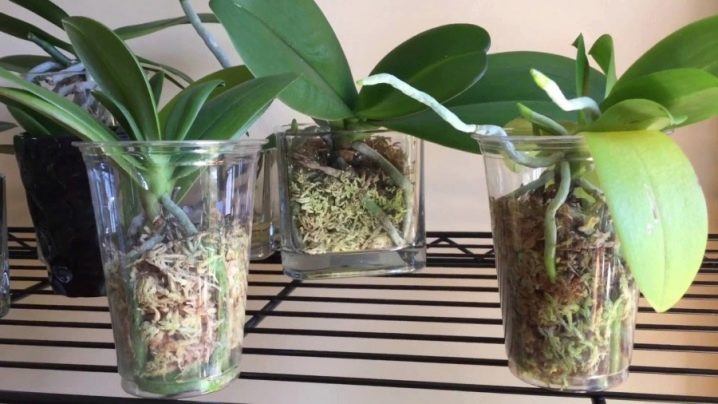
In order not to perform this procedure regularly, the gap between the walls of the pot and the walls of the planter should be filled with soil, moss or gravel. It is worth mentioning that the planter protects the roots of the orchid from direct sunlight and prevents the development of "blooming" - that is, after watering, the insides are not covered with moss or other growths. The elevation inside creates a "reservoir" for water, where excess liquid flows from the pot.


Today on the market there are a large number of different orchid planters, allowing you to make the most successful choice both in terms of benefits and in terms of design. By placement, wall, floor, tabletop and pendant models are distinguished. By the name it is easy to determine the main characteristics of the vessel. For example, a hanging planter is suspended from the ceiling or some kind of hook using a chain, rope, fishing line or other similar material. In the apartment, it is mounted on a beam or cornice.




Such a decor item is more suitable for flowers of small size and weight, since it will be easier to care for them at a height. Wall planters are fixed either on the wall or on the fence. The floor planter is placed on the floor, it is usually chosen for large varieties. Table pots are placed on a table or windowsill.




There are room, street and balcony containers. They can be both large and small. Street ones most often decorate garden plots, located near the porch, along paths or right in the beds. Room planters are designed for apartments. Balcony containers are usually made either wall-mounted or suspended, and they are placed on a loggia.
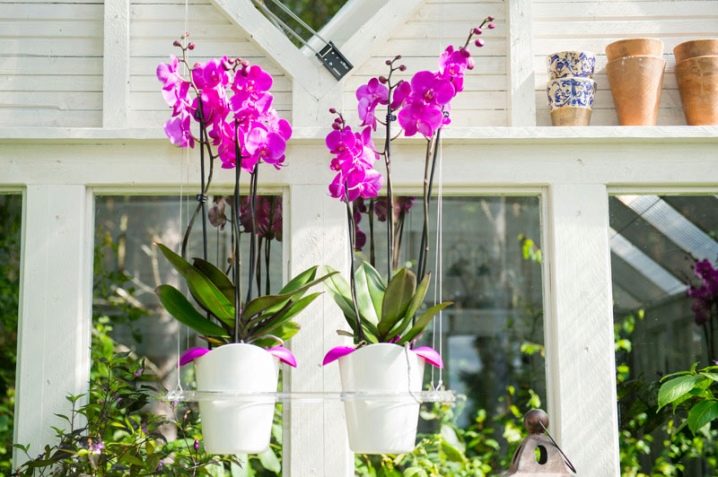
When choosing a planter, it is important to ensure that its width exceeds the width of the pot., otherwise the movement of air will be impeded, and the earth will not be able to dry out and will be wet all the time. In this case, the size of the inner pot should be a couple of centimeters larger than the size of the roots, and the pots should be the same 2-3 centimeters larger than the size of the inner container. At the bottom, it is important to have some kind of recess where water for irrigation will accumulate.

Materials (edit)
Plastic orchid planters are inexpensive, but not very durable and beautiful. However, transparent versions allow you to keep track of the state of the roots and the substrate. Many of them have additional ventilation holes, without which it is difficult for air to get inside. There are also glass variations of pots.They are best used for flowers planted in plastic pots with holes that, unlike glass, do not interfere with air exchange. Thus, nothing prevents the orchid from developing, but the container itself looks much more worthy. For beauty, it is recommended to use in this case a special multi-colored gel instead of a primer.


Wooden models look natural and fit organically into any interior. The only wish is to choose samples that have been treated with a solution that protects against moisture. Often a wooden planter is made from the remnants of slats, beams, or even branches. Ceramic pots are no less popular, which, due to their stability, are often chosen for street decoration. The surface can be simply painted in one or several colors, painted with images, or decorated with three-dimensional figures. High-tech style is usually accompanied by a decorative element made of either stainless steel or metal. For example, it can be an unusual multi-tiered wrought iron model.


Rattan is considered a fairly common option, especially when it comes to decorating a greenhouse or garden. In recent years, polystone has gained popularity - an environmentally friendly option that allows you to create even the most outlandish designs with flowers, animals and various fictional characters. With your own hands, it is easy and simple to make a pots-net from improvised ropes or cables, as well as sew a sack made of burlap. If we consider homemade pots for orchids, then craftswomen manage to create an interior item from old tin cans, an aquarium and glass glasses, plastic toys, old dishes and even shoes or a typewriter. It is worth mentioning that a floor planter made of any material can be easily turned into a hanging one if you braid it with thick threads.


Design
When the pots are made on their own, beads, shells, stones, ribbons, dried flowers, dry cereals and other available materials are most often used for decoration. It is customary to decorate a homemade item using decoupage technique. There are also many unusual models on store shelves. For example, it can be a plastic outdoor planter equipped with lighting. There are also original models combined with pet houses, which can significantly save space.

Standing apart is a model that resembles a tree with an animal in its hollow. The position of the latter determines whether there is enough water for the orchid. As soon as the moisture ends, the muzzle will go down. Many busy people choose self-watering planters such as the LECHUZA rectangular planter. It can be left without additional moisture for up to three months without worrying about the orchid dying.

The flower pot allows you to plant not only orchids, but also flowers favorably adjacent to them in one container. Ornamental grass will also be appropriate here. Flat samples can be made in the form of an open book, which will become a bright and original accent of any interior, or just a plate with a large diameter. A transparent planter can be made both in the form of an ordinary glass, and something more complex, for example, with a stand inside for the pot with an orchid itself.

Pastel models fit well into the classic interior, allowing you to focus on plants, and not on containers. If bright colors are used for pots, for example, green, then they should all be in the same palette to avoid excessive clumsiness. The blues and reds will make the plants seem to fade into the background, and the reds and oranges will come out to the front.

Popular models
The pots look stylish and modern "Crown"made of high quality polycarbonate. The container is equipped with a pallet of a suitable size.The "crown" is ideal for orchids, as it allows its roots to receive a sufficient amount of light and air. The diameter of the piece of furniture is 13 centimeters or 10 centimeters in the mini version. Height varies from 8 to 12 centimeters.

The product is available in several color variations, from pink to blue. The structure itself looks like several plastic rods located on a round base at regular intervals. In addition to the planter itself, you can purchase graceful supports with curls of the same shade, used to support the orchid. Looks "Crown" very beautiful and unusual, but not suitable for all varieties of flowers.

Orchid Wave cache-pot also available in various colors, such as purple and yellow, but it is made of transparent plastic. Its diameter reaches 14 centimeters and its volume is 1.3 liters. Inside the planter there is a special stand on which the pot with the plant is placed. This model is used without a pallet. M3147 looks similar "Orchid"... This planter was made in four color variations: purple, green, pink and transparent.

Beautiful examples
An ordinary flower vase can be easily transformed into a classic planter. It will be enough to cover the bottom with a rather high layer of drainage and place the flower inside in a transparent plastic pot. It will be possible to give it deliberate negligence if you stick a sticker of black paper on which they write with chalk on the surface. On the resulting label, you can sign the orchid variety or even give a name to the green "pet".

Another stylish and laconic solution would be to place the flower in a bowl-shaped planter with a white glossy surface. Its size even makes it possible not to be limited to one plant, but to immediately plant several varieties ..

Elongated ceramic planters can be made in different sizes and even shapes. A classic rectangular white vessel will complement a minimalist interior, and a rich lavender will ideally fit into the Scandinavian style or modern

For information on how to choose a planter for an orchid, see the next video.













The comment was sent successfully.